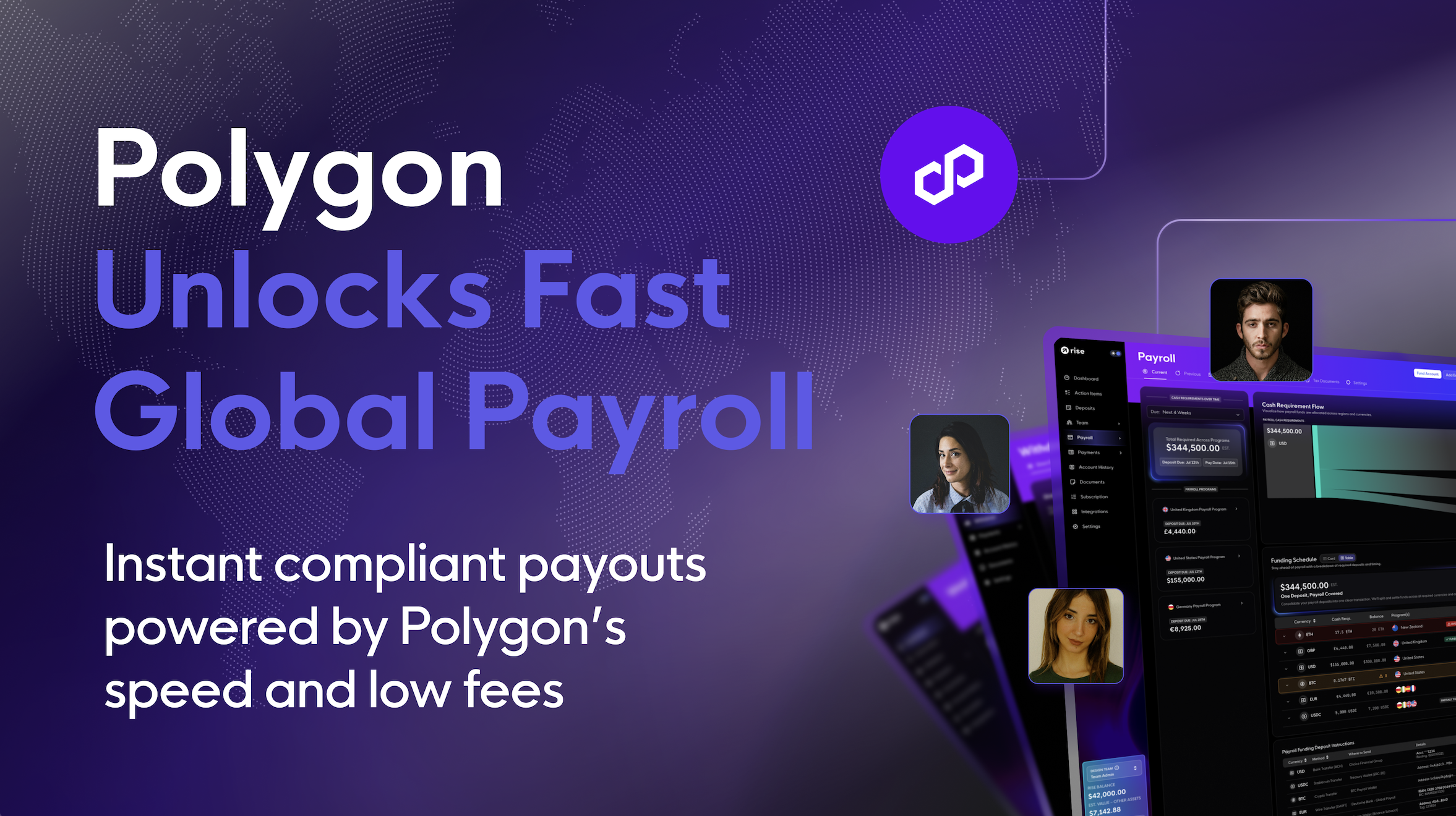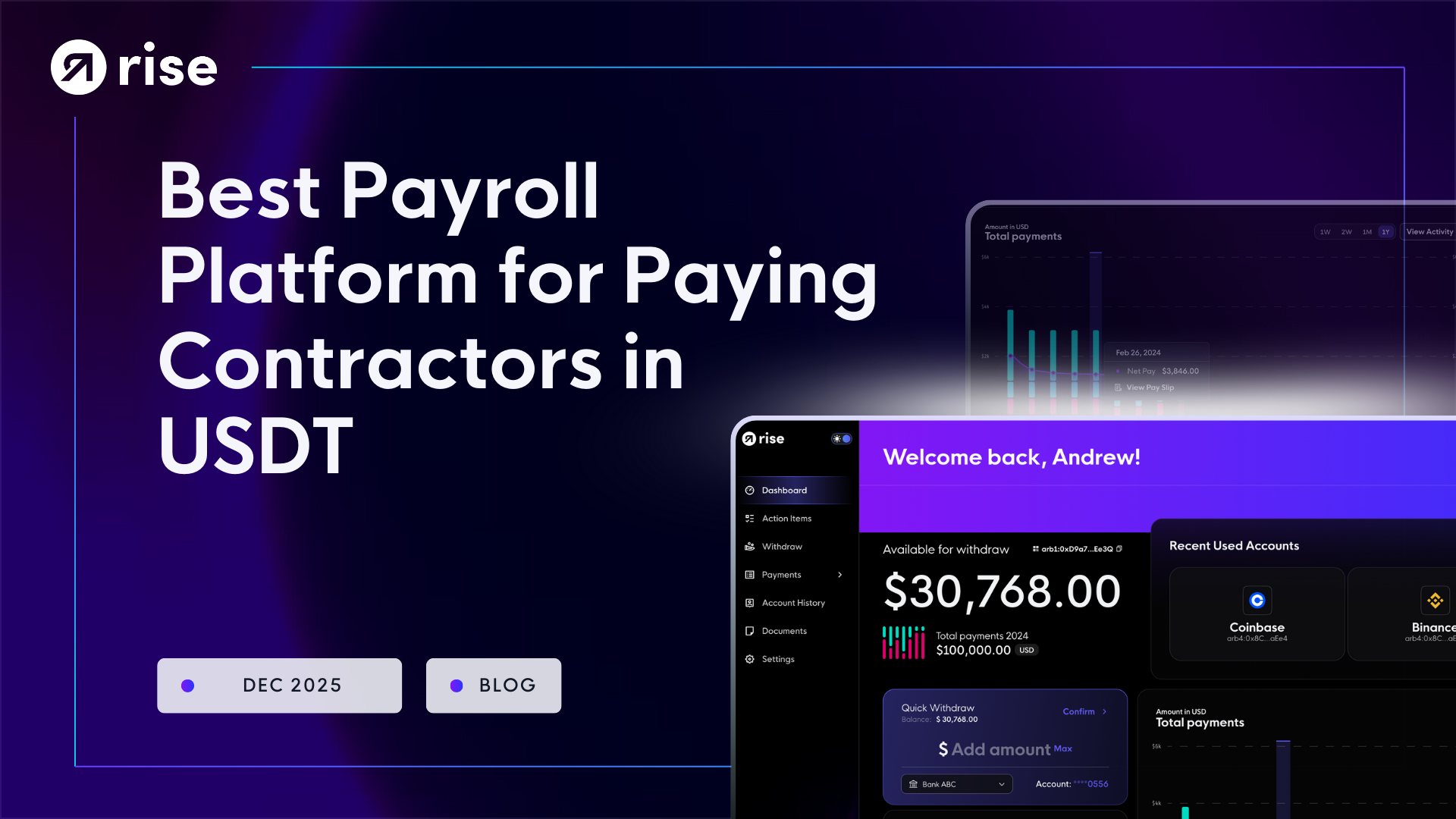Worldwide, crypto has steadily gained traction as a highly versatile asset. Institutional interest in the varied uses of crypto and blockchain technology has remained on a steady incline, with companies that range from insurance and healthcare providers to gaming and retail platforms eager to integrate this technology into their operational processes.
Diversified use cases across various business sectors and sustained interest in crypto as an investment asset are contributing to its anticipated compound annual growth rate of 12.5% by 2030.
Driven by projections that foresee crypto’s transformative impact on the business landscape, incorporating crypto into the fabric of work and compensation is a strategic imperative for forward-thinking organizations. With blockchain technology’s applications spanning from IT to HR processes, a great place to begin integration is with crypto payroll.
What is Crypto Payroll
Crypto payroll refers to the practice of compensating employees or contractors in crypto rather than traditional fiat currencies. In this system, workers receive their wages or salaries in the form of virtual assets, which are securely transferred to digital wallets and from there, can be HODLed, reinvested or converted to fiat currency and transferred to a traditional bank account.
Crypto payroll is gaining popularity as companies seek to harness the benefits of blockchain technology for efficient and transparent international payments. This approach brings with it advantages such as reduced transaction costs, faster cross-border payments, and the potential for employees to benefit from crypto as an investment asset.
What is Hybrid Payroll
Hybrid payroll is based on many of the same principles as crypto payroll, however it offers expanded options for payroll financing and contractor payouts across currencies that include fiat and stablecoins in addition to crypto.
It has emerged as a popular bridge between the web2 and web3 ecosystems. In the case of web3-native organizations such as Decentralized Autonomous Organizations (DAOs) that want the options to pay contributors in fiat, with a hybrid solution they can fund payroll in crypto and stablecoins via digital wallets and allow contributors to withdraw payouts in fiat. This modern approach to payroll caters to many sensibilities and provides heightened flexibility to both employer and payee.
The Advantages of Crypto and Hybrid Payroll
Crypto payroll and hybrid payroll offer a wide array of benefits that include the capacity to automate and scale global payouts as well as the ability to contract top global talent.
Cost-Efficient and Expedited Cross-Border Payments
While traditional forms of compensation for a global workforce are notoriously costly and slow, crypto steps in as a scalable antidote. Blockchain technology unlocks the ability to send and receive payouts close-to instantly, regardless of geographical location. Unlike wire transfers or platforms such as PayPal that take a significant cut of the money transacted, payments sent between digital wallets can cost as little as a few cents and, through the use of a crypto payroll solution, can be automated for increased scalability.
Transparency and Security
Blockchain technology provides an immutable ledger that records all crypto transactions. This transparency enhances security and reduces the risk of fraud or errors in payroll processing. Employees can independently verify their transactions on the blockchain, which instills trust in the payment process.
Financial Inclusion
Crypto payroll can open the doors to a global workforce once unreachable due to lack of access to traditional banking systems. In Latin America, where 70% of the population is unbanked, crypto has surfaced as a key financial tool. Instead of relying on a centralized intermediary for compensating contractors, remuneration can be sent directly to an individual’s digital wallet.
Choosing a Crypto Payroll Solution
When beginning the process of onboarding with a crypto payroll solution or a hybrid payroll solution, it's important to start by finding the best fit for your company's needs and infrastructure. Prioritizing flexibility and the option to receive payments across crypto, stablecoins, and fiat is of principal importance. Our comprehensive analysis explores some of the leading solutions currently on the market to provide an overview of the features and advantages each product has to offer.
Rise
Rise is an all-in-one crypto and fiat payroll and compliance solution built for traditional companies and web3-native organizations alike. Developed to meet the diverse needs of a global workforce, one of Rise’s fundamental attributes that sets it apart from other crypto payroll solutions is its unique level of flexibility.
Rise’s flexible routing infrastructure allows companies to fund payroll in the currency of their choice, from crypto in a digital wallet to fiat in a traditional bank account, and for contractors to withdraw payouts in their preferred currency, across 90 fiat currencies and 100 cryptos.
While it's clear that many people are interested in receiving full or partial payment in crypto, it's important to ensure that options for fiat payments are also available. With Rise, payees can choose how to withdraw their payments, which can include payouts in a combination of crypto, fiat, and stablecoins.
Companies can streamline cross-border compensation with Rise’s automated mass, global payouts and add a security layer to payroll with the RiseID, a self-sovereign on-chain identity minted by all Rise users.
In addition to payroll services, Rise also facilitates and automates the hiring process. Rise runs KYC checks to verify contractor identity and compliance in minutes, automates professional service agreements, and handles global tax forms.
Request Finance
Request Finance is a blockchain-based platform built to address the specific challenges web3-native organizations face with respect to payroll. It allows for streamlined compensation for crypto-native companies and DAOs tackling global compensation with a remote-first approach.
Request Finance simplifies the management of crypto treasuries and payroll while leveraging the benefits of blockchain technology to allow for contractors and organizations to have full control over their data at all times.
While Request provides the payroll layer, what it lacks is the infrastructure for streamlining HR processes and workforce management.
Deel
Deel is a payroll solution that simplifies the process of hiring and compensating remote workers. Companies can onboard and manage their workforce and ensure compliance with labor and tax laws through the Deel platform.
Deel offers a secure and efficient way to process payroll, supporting a range of payment methods which include direct bank transfers as well as compensation in crypto.
Despite allowing for crypto payments, Deel does not operate within the DeFi ecosystem and instead goes through Coinbase, a Centralized Exchange. This poses a major drawback for companies seeking a web3-native platform that supports self-custody.
Bitwage
Bitwage is a web3-enabled platform that modernizes the way individuals and businesses handle payroll and wages. It is an easy-to-use solution for employers that want the option to compensate their workforce in crypto.
A service that sets Bitwage apart from other solutions on the market is its unique Bitcoin 401(k) plan. Through this feature, Bitwages users can invest in crypto with Roth 401(k), effectively eliminating taxes.
Though Bitwage provides a wide range of services, a difficulty that arises is the complexity and confusion of its pricing plans which can make it inaccessible. Additionally, it has a hard limit on the number of cryptocurrencies available for funding payroll and receiving compensation.
Utopia Labs
Designed to meet the financial needs of crypto companies and DAOs, Utopia Labs is a banking service that helps streamline treasury management and scale fiat to crypto (and vise versa) operations. Utopia is committed to ensuring low fees and expedited transaction times for the offramping of crypto while guaranteeing that all operations are compliant.
A downfall of Utopia’s infrastructure is the limited options for off-ramping; Utopia can only off ramp USDC in the US for fiat currency. Additionally, beginning in November Utopia will no longer offer crypto payroll solutions to crypto startups and DAOs
Franklin
Franklin is a modern payroll solution addressing the unique demands of the growing remote workforce. It offers a range of features designed to facilitate payroll management and issue payments both in the US and internationally while serving as a bridge between web2 and web3.
Workers can seamlessly submit their invoices which are subsequently responded to and paid out by administrators. While Franklin supports ERC-20 tokens and over 300 digital wallets, it has limited flexibility due to the fact that payments can only be crypto to crypto or fiat to fiat, rather than a combination of the two. This is a major disadvantage for companies that want the ability to fund payroll in crypto while allowing payees the option to withdraw payments in fiat, crypto, or stablecoins (or vise versa).
Toku
With its mission rooted in simplifying token compensation and tax compliance, Toku provides tools for token payroll management and one-click global payouts. Toku is responding to the rising need for compliant ways to remunerate global teams in crypto.
To effectively do this work, they have made themselves experts in understanding local and global tax and employment laws in 100 different countries to ensure that token payroll is fully tax compliant.
While Toku is a great option for companies that are operating exclusively within the crypto sphere, it is very limited when it comes to offering expanded options for remuneration since it does not provide hybrid payroll services.
Gusto
Gusto handles not only payroll but provides the additional service of automatically filing taxes to streamline the compliance process. Outside of its comprehensive payment services within the US, Gusto helps company’s pay their contractors in 120 countries worldwide.
The payroll services that Gusto provides are great for companies managing remote, local and global teams, however they are limited in their currency offerings. At present, they provide zero options for funding a company’s payroll in crypto or allowing for crypto payouts. Additionally, while they provide tax services, Gusto does not have an option for KYC or AML checks.
Justworks
Designed to simplify HR processes for small businesses, Justworks handles compliant hiring and onboarding, payroll services, and benefit administration. Justworks provides its services in all fifty states and to contractors in over thirty countries internationally.
While the combination of payroll, compliance, and benefit administration that Justworks offers can be suitable for traditional companies, the lack of expanded currency options is limiting. Without the ability to pay in crypto and stablecoins, global hiring is restricted and companies looking for competitive compensation packages will not have their needs met.
Hybrid Fiat & Crypto Payroll Solutions and the Future of Work
The landscape of global workforce management is evolving rapidly, and the integration of crypto and hybrid payroll solutions has emerged as a pivotal step forward for future-facing companies. The convergence of blockchain technology and payroll management presents an opportunity to streamline the complexities of international compensation while staying compliant with local regulations.
As the business world hurdles into the digital era at breakneck speed, remaining agile becomes more important than ever before. The flexibility offered by hybrid payroll solutions such as Rise empowers organizations to operate with heightened agility.
Schedule a demo today to learn more about how the integration of blockchain technology and crypto payroll can scale your global workforce and streamline HR processes.




















